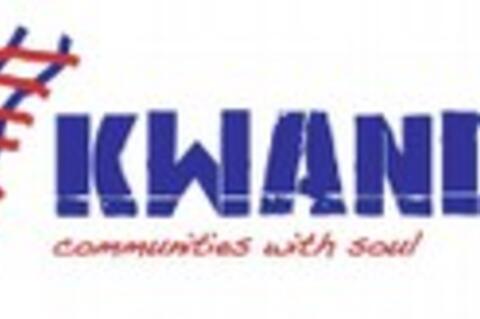Kwanda

Five volunteer teams for the television series were recruited from across South Africa. Each of the participating communities chose 50 participants who underwent 5 weeks of training in a special learning camp where they learned new skills on how to organise themselves. Ten of the participants from each community also took part in training in fashion design and sewing, so that they could become part of the Kwanda Clothing project, which will be launched during the television series. The closing project seeks to put together an urban street wear collection, create jobs, and teach entrepreneurial skills.
The teams were filmed as they worked to address some of the biggest challenges their communities face. The Kwanda teams have been helping orphans, reducing alcohol abuse and alcohol-related violence, generating income, creating jobs, and reducing new HIV infections. The series tracks their journey and aims to support communities who are facing similar issues by providing ideas for action as well as relevant contact information.
The television series started broadcasting on September 2 2009 (21h00-22h00), on SABC 1 with repeats in the morning of the following day. At the end of the series, the television audience rewarded the team they believe has made the biggest difference in their community with a major prize.
Episode synopsis/breakdown:
- Episode 1: The people of the 5 Kwanda teams compete to improve the lives of those around them. They face challenges in their communities like unemployment, teenage pregnancy, HIV, underage drinking, and crime. Not everything goes according to plan, but they learn some important lessons.
- Episode 2: The Kwanda crew are in Kwakwatsi, Free State, where Oumaki finds 2 disabled children in desperate need.
- Episode 3: In Kwakwatsi, Free State, the Kwanda team find Seun, an 11-year -old child who has never been to school. This episode also looks at the challenges faced in turning their sewing enterprise into a profitable business.
- Episode 4: In Pefferville, East London, Posia's friend is raped. The Kwanda team respond and clear a dangerous area where the rape took place. They work with the local police chief.
- Episode 5: The Kwanda team in Pefferville are working hard to win a printing contract that will bring much-needed funds to this economically poor and crime-ridden community. But things get tougher when they find that crime is happening inside their own team.
- Episode 6: In Lephephane, Limpopo, the Kwanda team learns that it takes a village to raise a child. Tommy discovers what problems alcohol abuse can cause in families. The team speaks to the tavern owners about what can be done.
- Episode 7: The Kwanda team in Lephephane, Limpopo decide that One Love is best. They take on the sugar daddies who are endangering young girls' lives.
- Episode 8: In Mthwalume, KwaZulu Natal, 12 children from the village have died in road accidents; the team take action to prevent more deaths. They also bring in social workers when they find elderly women in need of help.
- Episode 9: The Kwanda team in Mthwalume, KwaZulu Natal, respond when 3 workers die in a building accident at their school. The team also face an internal crisis when they report their chairperson for stealing.
- Episode 10: In Tjakastad in Mpumalanga, the Kwanda team elects Themba, one of the towns's most feared gangsters, as their leader. They call the gangs together for the first time in 8 years to look for solutions.
- Episode 11: The Kwanda team in Tjakastad, Mpumalanga, start street patrols to make their community safer. It is a complete turnaround for Themba, the ex-gangster, but will the people from his area accept him back after the pain he has caused them in the past?
- Episode 12: It is Kwanda Week, and viewers are given a chance to decide which team has done the most to make their community look better, work better, and feel better. The show goes back to each team to see how much more work they have done.
- Episode 13: In this live final show of the Kwanda series, the teams are brought together and finally find out which team has won the Kwanda audience prize.
The Kwanda website includes information about the issues raised in the episodes, information on how to get involved, and a social networking space to interact with Kwanda coaches.
Community Development
The name Kwanda is derived from the Nguni word, ukwanda. It means to grow or to develop. The name was selected by community members when Soul City was developing the programme. They said that the project helped them to grow and to develop themselves.
Soul City Institute, Department of Social Development, SABC 1, Department of Health, British Petroleum (BP), Mobile Telephone Networks (MTN), Department for International Development (DFID), United States (US) Centers for Disease Control and Prevention (CDC), US President's Emergency Plan for AIDS Relief (PEPFAR), and South African Local Government Association (SALGA).
Soul City website on August 31 2009; and Kwanda website, June 24 2010.
Comments

re- emplementand // launced structure of kwanda in phalaborwa
we as member of the community in phalaborwa we have imlementaed the structure in community for adress the issues of social economic problems in our communty, for example 1.to clean all street in our community.
2.to ensure that all learners are in school during school ours.
3.to clean goverment istitution in our community.
4.to decrease crime in our community.
5. to act against abuse in our communities.
we are 784 community members in address in addressing the above indicated issues.
our tel: 082 427 0203 for more information the regarding the organisation.
- Log in to post comments
